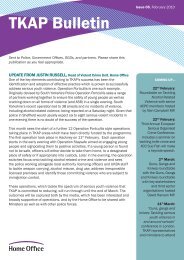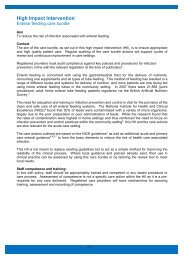Sexualistation of Young People
Sexualistation of Young People
Sexualistation of Young People
You also want an ePaper? Increase the reach of your titles
YUMPU automatically turns print PDFs into web optimized ePapers that Google loves.
8. Recommendations<br />
Introduction<br />
I believe that reviews like this one<br />
should not only raise awareness and<br />
define the issues, they should also look<br />
at possible solutions and ways forward.<br />
Throughout the course <strong>of</strong> my work on<br />
the review, some people have suggested<br />
that the problem <strong>of</strong> sexualisation is so<br />
complex and so endemic that it will be<br />
practically impossible to bring about<br />
real change. I don’t believe that this is<br />
the case. Sexualisation is undoubtedly<br />
a complex and multi-factorial issue, but<br />
social change is always possible, as long<br />
as people are sensitised to the need for<br />
that change to occur.<br />
1) Education and<br />
schools<br />
i) Promoting gender equality in schools<br />
Schools have a vital role to play, together<br />
with parents, in helping young people to<br />
develop healthy relationships, manage<br />
their emotions, and challenge the<br />
behaviour <strong>of</strong> some young men towards<br />
women and girls.<br />
School staff report that they do not<br />
have the skills or confidence to address<br />
gender equality. They need to be aware<br />
<strong>of</strong> the significant impact <strong>of</strong> gender on<br />
experiences within school; and to know<br />
how to identify and address aspects <strong>of</strong><br />
The recommendations outlined below<br />
are derived from the main themes that<br />
have emerged from the review. They<br />
have evolved through consultations with<br />
pr<strong>of</strong>essionals who work on the front<br />
line in relevant areas and they have been<br />
informed by those working with the<br />
practicalities and logistics <strong>of</strong> government<br />
policy. What is required is a joint effort<br />
by parents, teachers, pr<strong>of</strong>essionals,<br />
clinicians, advertisers, retailers and policy<br />
makers. For the greatest social change<br />
comes not from addressing one aspect<br />
<strong>of</strong> a problem but from the cumulative<br />
effect <strong>of</strong> many people acknowledging<br />
together that change needs to happen.<br />
the school culture which discriminate<br />
against women and encourage or justify<br />
gender inequality, sexual bullying and<br />
harassment. I believe there is a need for a<br />
greater emphasis in initial teacher training<br />
and continuing pr<strong>of</strong>essional development<br />
on gender awareness and gender-based<br />
volence. I recommend that:<br />
• All school staff should have training<br />
on gender equality.<br />
• Staff who teach Personal, Social,<br />
Health and Economic (PSHE)<br />
education and/or citizenship should<br />
be given specialist training and<br />
ongoing support to address these<br />
issues through the curriculum.<br />
Sexualisation <strong>of</strong> <strong>Young</strong> <strong>People</strong> Review<br />
75

















